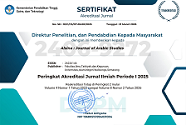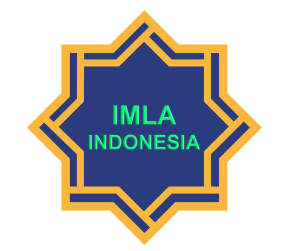Problematika Non-Linguistik Pembelajaran Bahasa Arab Kurikulum 2013 Pascapandemi Covid-19 di MI Darul Ulum Ngaliyan Semarang
DOI:
https://doi.org/10.21580/alsina.4.2.14599Keywords:
Curriculum 2013, implementation problems, learning ArabicAbstract
This research aims to describe the non-linguistic problems of implementing the 2013 curriculum in Arabic learning at MI Darul Ulum Ngaliyan Semarang after the COVID-19 pandemic and efforts to overcome them. The method used in this research is descriptive qualitative. Data were collected by interview and documentation. Non-linguistic problems are found in the process of learning activities and human resources. The problems of learning activities include interaction patterns, learning models and techniques, learning media, assessments, teaching materials, and learning processes. The problems of human resources are in the teacher and heterogeneity of students, low interest in learning Arabic, and lack of understanding of students in Arabic. Therefore, teachers must prepare, develop, and make learning Arabic as good and interesting as possible so that students become excited to learn Arabic.
Downloads
References
Akhsan, Akhsan, and Ahmadi Muhammadiyah. “Membangkitkan Potensi Diri dan Minat Siswa dalam Belajar Bahasa Arab dengan Nilai-Nilai Hypnoteaching.” Lahjah Arabiyah: Jurnal Bahasa Arab dan Pendidikan Bahasa Arab 2, no. 1 (2021): 40–51. https://doi.org/10.35316/lahjah.v2i1.1051.
Al-Ḥadīdī, ʿAlī. Mushkilat Taʿlīm al-Lughah al-ʿArabīyah li-Ghayr al-ʿArab. Cairo: Dār al-Kātib al-ʿArabī, 1966.
Albantani, Azkia Muharom. “Implementasi Kurikulum 2013 pada Pembelajaran Bahasa Arab di Madrasah Ibtidaiyah.” Arabiyat: Jurnal Pendidikan Bahasa Arab dan Kebahasaaraban 2, no. 2 (2015): 178–91. https://doi.org/10.15408/a.v2i2.2127.
Alfataftah, Ghassan I., and Amani G. Jarrar. “Developing Languages to Face Challenges of Globalization and Clash of Civilizations: Arabic Language as an Example.” Journal of Education and Learning 7, no. 4 (2018): 247–53. https://doi.org/10.5539/jel.v7n4p247.
Amalia, Nur Rizki. Problematika penerapan Kurikulum 2013 di MI Ma’arif NU Kedung Kendo Candi Sidoarjo (Undergraduate Thesis). Surabaya: (UIN Sunan Ampel Surabaya), 2021.
Amelia, Delora Jantung. “Problematika Implementasi Kurikulum 2013 di SD Wajak.” ELSE (Elementary School Education Journal) : Jurnal Pendidikan dan Pembelajaran Sekolah Dasar 2, no. 2 (2018): 21–29. https://doi.org/10.30651/else.v2i2.1717.
Arif, Muhamad, and Sulistianah Sulistianah. “Problems in 2013 Curriculum Implementation for Classroom Teachers in Madrasah Ibtidaiyah.” Al Ibtida: Jurnal Pendidikan Guru MI 6, no. 1 (2019): 110–23. https://doi.org/10.24235/al.ibtida.snj.v6i1.3916.
Asmara, Chandra. “Jokowi Izinkan Warga Lepas Masker, Ini Penjelasan Lengkapnya.” CNBC Indonesia, 2022. https://www.cnbcindonesia.com/news/20220517171322-4-339601/jokowi-izinkan-warga-lepas-masker-ini-penjelasan-lengkapnya.
Cahyadi, Ani, Hendryadi, Sri Widyastuti, and Suryani. “COVID-19, Emergency Remote Teaching Evaluation: The Case of Indonesia.” Education and Information Technologies 27, no. 2 (2022): 2165–2179. https://doi.org/10.1007/s10639-021-10680-3.
Direktorat KSKK Madrasah Direktorat Jenderal Pendidikan Islam. Keputusan Menteri Agama Nomor 183 Tahun 2019 tentang Kurikulum PAI dan Bahasa Arab pada Madrasah. Jakarta: Kementerian Agama, 2019.
Hanifah, Umi, and Imam Mahmudi. “Thathbiq al-Taqyim al-Waqi’i bi al-Manhaj al-Dirasi 2013 Fi Ta’lim al-Lughah al-‘Arabiyah.” Arabiyatuna : Jurnal Bahasa Arab 4, no. 2 (2020): 279–300. https://doi.org/10.29240/jba.v4i2.1792.
Karakuş, Gülçin. “A Literary Review on Curriculum Implementation Problems.” Shanlax International Journal of Education 9, no. 3 (2021): 201–20. https://doi.org/10.34293/education.v9i3.3983.
Kartikasari, Devfy, and Zulfikar Mujib. “Hambatan Pengimplementasian Kurikulum 2013 pada Proses Pembelajaran Universalime Islam (PAI).” Belajea; Jurnal Pendidikan Islam 5, no. 2 (2020): 181–98. https://doi.org/10.29240/belajea.v5i2.1606.
Lubis, Saiful Akhyar, Wahyudin Nur Nasution, Tri Rifai Alam, and M. Fajri Syahroni Siregar. “Problems of the Implementation of the 2013 Curriculum in Islamic Religious Education Lessons in Forming Akhlakul Karimah at SMK Raudlatul Uluum-1 Aek Nabara Labuhanbatu.” Ta’dib : Jurnal Pendidikan Islam 10, no. 2 (2021): 237–48. https://doi.org/10.29313/tjpi.v10i2.8093.
Miles, Matthew B., A. Michael Huberman, and Johnny Saldana. Qualitative Data Analysis: A Methods Sourcebook. 3rd ed. California: SAGE Publications, Inc, 2014.
Mislinawati., Mislinawati, and Nurmasyitah Nurmasyitah. “Kendala Guru dalam Menerapkan Model-model Pembelajaran Berdasarkan Kurikulum 2013 pada SD Negeri 62 Banda Aceh.” Jurnal Pesona Dasar 6, no. 2 (2018): 22–32. https://doi.org/10.24815/pear.v6i2.12194.
Mufti, Ali, and Mudrofin Mudrofin. “Analisis Kesesuaian Kompetensi Dasar dengan Bahan Ajar Bahasa Arab MTs Kelas IX Karya Yushi M. Mahmudah.” Alsina : Journal of Arabic Studies 3, no. 1 (2021): 81–102. https://doi.org/10.21580/alsina.3.1.10432.
Mukhtar, Ilham, and Jamal Fauzi. “Methodological Problems of Teaching Arabic to Non-Native Speakers in Indonesia.” Ittishal Educational Research Journal 1, no. 1 (2020): 72–81. https://doi.org/10.51425/ierj.v1i1.4.
Mustaqim, Mustaqim, and Darnoto Darnoto. “Problematika Implementasi Kurikulum 2013 dalam Aspek Pembelajaran di Madrasah.” Tarbawi : Jurnal Pendidikan Islam 15, no. 2 (2018): 93–108. https://doi.org/10.34001/tarbawi.v15i2.851.
Nurcholis, Ahmad, Mochamad Chobir Sirad, Budi Harianto, and Syaikhu Ihsan Hidayatullah. “The Ontology of Arabic Curriculum at Pesantren Attahdzib Jombang.” Arabi : Journal of Arabic Studies 5, no. 2 (2020): 153–65. https://doi.org/10.24865/ajas.v5i2.247.
Nurjannah, Nurjannah. “Analisa Kebutuhan sebagai Konsep Dasar dalam Pengembangan Kurikulum Bahasa Arab di MAN Curup.” Arabiyatuna : Jurnal Bahasa Arab 2, no. 1 (2018): 49–72. https://doi.org/10.29240/jba.v2i1.409.
Pak, Katie, Morgan S. Polikoff, Laura M. Desimone, and Erica Saldívar García. “The Adaptive Challenges of Curriculum Implementation: Insights for Educational Leaders Driving Standards-Based Reform.” AERA Open 6, no. 2 (2020): 1–15. https://doi.org/10.1177/2332858420932828.
Pranata, Iwan. “Developing Students’ Tendency, Motivation, and Confidence in Learning Arabic Language.” Ittishal Educational Research Journal 1, no. 1 (2020): 51–58. https://doi.org/10.51425/ierj.v1i1.7.
Rohman, Miftahur. “Pembelajaran Bahasa Arab di Madrasah Aliyah dalam Perspektif Kurikulum 2013.” An Nabighoh: Jurnal Pendidikan dan Pembelajaran Bahasa Arab 20, no. 2 (2018): 222–46. https://doi.org/10.32332/an-nabighoh.v20i02.1286.
Safitri, Dewi. Problematika Guru dalam Menerapkan Kurikulum 2013 pada Mata Pelajaran Bahasa Arab di Kelas VII MTs Al-Khairaat Wosu Kecamatan Bungku Barat Kabupaten Morowali (Undergraduate Thesis). Palu: UIN Datokarama Palu, 2022.
Satori, Djam’an, and Aan Komariah. Metodologi Penelitian Kualitatif. Bandung: Alfabeta, 2017.
Sugiyono. Metode Penelitian Kuantitatif, Kualitatif, Dan R&D. Bandung: Alfabeta, 2017.
Sunarko, Asep, and Sholeh Sholeh. “Strategi Peningkatan Mutu Pembelajaran Bahasa Arab di Madrasah Tsanawiyah Salafiyah Al Tarmasi.” Lisanan Arabiya: Jurnal Pendidikan Bahasa Arab 2, no. 2 (2019): 233–53. https://doi.org/10.32699/liar.v2i02.652.
Suyanto, Slamet. “A Reflection on the Implementation of a New Curriculum in Indonesia: A Crucial Problem on School Readiness.” In AIP Conference Proceedings, 1868:1–15, 2017. https://doi.org/10.1063/1.4995218.
Tafsir, Ahmad. Ilmu Pendidikan Islami. Bandung: Remaja Rosdakarya, 2016.
Wibowo, Fatih Rizqi. “Promblematika Pembelajaran Bahasa Arab Kurikulum 2013.” al Mahāra: Jurnal Pendidikan Bahasa Arab 2, no. 1 (2016): 49–60. https://doi.org/10.14421/almahara.2016.021-03.
Wijngaards-de Meij, Leoniek, and Sigrid Merx. “Improving Curriculum Alignment and Achieving Learning Goals by Making the Curriculum Visible.” International Journal for Academic Development 23, no. 3 (2018): 219–31. https://doi.org/10.1080/1360144X.2018.1462187.
Downloads
Published
How to Cite
Issue
Section
License
Copyright
The copyright of the received article shall be assigned to the publisher of the journal. The intended copyright includes the right to publish the article in various forms (including reprints). The journal maintains the publishing rights to published articles. Authors are allowed to use their articles for any legal purposes deemed necessary without written permission from the journal, but with an acknowledgment to this journal of initial publication.
Licensing
In order for Alsina: Journal of Arabic Studies to publish and distribute research articles, the editors need publishing rights (transferred from author to publisher). This agreement relates to the transfer/publishing copyright license to Alsina: Journal of Arabic Studies but the authors still have significant rights to use and share their published articles.
Alsina: Journal of Arabic Studies supports the need for writers to share, disseminate and maximize the impact of their research and their rights on any database. As a journal article writer, you have the right to various uses of your articles, including that by the institution or company where you work. Copyright can be used without the need for special permission. Authors who publish articles in the Alsina: Journal of Arabic Studies have broad rights to use their work for teaching and scientific purposes without requesting permission, including:
- Use by the author for lectures, presentations, or conferences, with distribution of copies to participants;
- Distribution to colleagues for research use;
- Use in compilations of the author's subsequent work;
- inclusion in a thesis or dissertation;
- Reuse of sections or excerpts from articles in other works (with full acknowledgment of the final article);
- Preparation of derivative works (other than commercial purposes) (with full acknowledgment of the final article);
- Voluntary posting on open websites operated by authors’ or writers' agencies for scientific purposes
When submitting a manuscript, authors do so on the understanding that if accepted for publication, the copyright for publishing (publishing right) of the article shall be assigned/transferred to Alsina: Journal of Arabic Studies.
Authors whose articles are accepted for publication will receive confirmation via email and sent a Copyright Transfer Agreement.


 Accreditation
Accreditation 
 In Collaboration with
In Collaboration with 

 Visitors
Visitors  Article Template
Article Template





